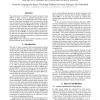Free Online Productivity Tools
i2Speak
i2Symbol
i2OCR
iTex2Img
iWeb2Print
iWeb2Shot
i2Type
iPdf2Split
iPdf2Merge
i2Bopomofo
i2Arabic
i2Style
i2Image
i2PDF
iLatex2Rtf
Sci2ools
114
click to vote
INTERSPEECH
2010
2010
Using a DBN to integrate sparse classification and GMM-based ASR
The performance of an HMM-based speech recognizer using MFCCs as input is known to degrade dramatically in noisy conditions. Recently, an exemplar-based noise robust ASR approach, called sparse classification (SC), was introduced. While very successfully at lower SNRs, the performance at high SNRs suffered when compared to HMM-based systems. In this work, we propose to use a Dynamic Bayesian Network (DBN) to implement an HMM-model that uses both MFCCs and phone predictions extracted from the SC system as input. By doing experiments on the AURORA-2 connected digit recognition task, we show that our approach successfully combines the strengths of both systems, resulting in competitive recognition accuracies at both high and low SNRs.
Digit Recognition Task | HMM-based Speech Recognizer | INTERSPEECH 2010 | Noise Robust Asr | Signal Processing |
| Added | 18 May 2011 |
| Updated | 18 May 2011 |
| Type | Journal |
| Year | 2010 |
| Where | INTERSPEECH |
| Authors | Yang Sun, Jort F. Gemmeke, Bert Cranen, Louis ten Bosch, Lou Boves |
Comments (0)

